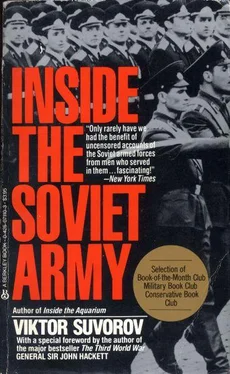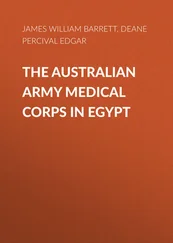The KGB, too, keeps a close eye on me. In every company there are sure to be half a dozen informers. And who is the first person on whom they report? The company commander, of course, although they also report on the man who is trying to penetrate my very soul, the political officer. So the Chekist runs into me, apparently by chance. `Drop in and we'll have a chat. When I do so, he, too, encourages me to marry. The KGB, too, is keen to get every officer married. They won't give me accommodation or time off either but they will put pressure on me.
The KGB likes to have a spy in each officer's home. If I do something wrong and my wife falls out with me, she will keep the Chekist informed of my interests and my contacts.
3
The Army would prefer me not to drink at all. The Party does not express itself clearly on the subject. From one point of view alcohol is obviously highly undesirable, but against this, they reason, what am I likely to begin thinking about if my head is not spinning with the accursed stuff? The KGB simply avoids expressing any opinion, but whenever I meet the Chekist he always offers me something to drink. If I don't drink anything at all, I am unlikely to unburden myself to him. And, if I don't drink myself into a stupor each evening, how can he hope to hear about my innermost thoughts?
The Army totally disapproves of alcohol. And yet the regimental shop sells shoe-polish, toothpaste, vodka — a great deal of vodka — and nothing else at all. Evidently, the Army's position is dictated by pressure exerted by the Party and the KGB, neither of which ever clearly states its own points of view.
4
There has been more fighting — a new war in the Middle East. Once again, our `brothers' have somehow suffered defeat. The Army requires me to explain to my soldiers the tactical errors which have led to this. I do so. I describe to them how a small, determined country wages war. No propaganda — heaven forbid! I simply describe the operations conducted by the two sides calmly and dispassionately, as if the war had been a game of chess.
Soon I find myself summoned to the political officer and then by the special department, too. So, no, this year I shan't be going to the Academy. If either the Party or the KGB are displeased with me, it is not worth the Army's while to stick up for me. My superiors are only human and they don't want to pick a fight with two such powerful forces just about me. There are plenty of other young officers in the Army this year who are eligible for the Academy in every respect.
Who Becomes a Soviet Officer and Why?
1
The great ideals of Socialism are simple and can be understood by anyone.
Society is built upon reasonable principles. Unemployment is a thing of the past. Medical services are free. Food, in reasonable quantities, is free, too. Every person has a separate room, with light and ventilation. Water, drainage and heating are free. Everyone has the right to some free time. There are no rich or poor. Everyone has comfortable, durable clothing, appropriate to the time of year — and this is, of course, provided free. Everyone is equal before the law.
You may say that this is nothing but a beautiful dream, that no one has ever succeeded in building pure socialism. Nonsense. In every country there are already islands of pure, untainted Socialism, in which each one of these requirements are met.
Is there a prison in your town? If so, go and take a look at it — you will find yourself in a society in which everyone is fed, and everyone has work, in which clothing, accommodation and heating are all provided free.
Soviet Communists are frequently reproached for having attempted to build a socialist society but having produced something which closely resembles a prison. Such a charge is entirely unjustified. In the Soviet Union some of the inmates have larger cells than others, some eat well, others badly. There is complete confusion — a lot remains to be done to tidy up the situation. True socialism, in which everyone is truly equal, does not just resemble a prison — it is a prison. It can not exist unless it is surrounded by high walls, by watchtowers and by guard-dogs, for people always want to escape from any socialist regime, just as they do from a prison. If you try to nationalise medicine and, from the best possible motives, to guarantee work for all the doctors, you will find that they pack their bags and leave the country. Try to bring a little order into the situation and your engineers (the best ones), your designers, your ballerinas (again, the best ones) and many, many others will also flee abroad. If you continue your attempts to establish a model society you will need to build walls around it. You will be forced to do this sooner or later by the flood of refugees.
2
The Politburo is the governing body of the prison. You should not abuse them for the privileges they possess. Those in charge of a prison must be better off in some ways than the convicts. The KGB are the warders, the Party is the administrative and educational organisation, the Army guards the walls.
When I am asked why I chose to become a Soviet officer, I say that those who serve as guards are better fed and have a pleasanter and more varied life than those in the cells. It was only some time after I joined the Army that I realised that it is far easier to escape from a prison if you are one of the guards. Trying to escape from a cell is a hopeless business.
In most states, life in the armed services is far more strictly regulated than it is for most of the inhabitants.
In the USSR, however, the reverse is true. The whole society finds itself in prison and, even though the Armed Services are kept under the tightest possible control (although even guards must be relieved), the life of an officer is far better than the drudgery which is the lot of the ordinary Soviet citizen.
While I was still one of those guarding our beloved prison, I carried out a sociological investigation among my brother officers, in an attempt to discover what had led them to tie themselves, hand and foot, to the Soviet Army, without expecting any guarantees or any form of contract. Naturally, I approached my colleagues with the greatest care and discretion.
`You remember, I would ask, `how, when Khrushchev came to power he had 1,200,000 men thrown out of the Army with a stroke of his pen? Your father was one of them; after another three months he would have completed 25 years' service. He was kicked out like a dog, without any sort of pension, in spite of his medals and despite the blood which he had shed for the country during his four years of war service. How did you, Kolya / Valentin / Konstantin Ivanovich, come to choose an officer's career in spite of that?
I collected several hundred replies to my question. They all amounted to the same thing — everyone wanted to escape the drabness of life in our prison cells.
Higher Military Training Colleges
1
If you decide to become a Soviet officer, you would be well advised to lose no time and to submit your application as soon as you leave school.
The training of officers is carried out by Higher Military Colleges. The authorities consider, reasonably enough, that if you are to become a good officer you must first be a good soldier. Training at a college lasts for between four and five years and during this time a future officer leads a tough existence, which combines the hardships of a soldier's life in barracks with the penury of a Soviet student's existence. Instruction begins at the very beginning, with a ferocious course of square-bashing. The sergeants who put you through this have completely arbitrary powers over you, whether or not you have already put in two years of military service. Once you have decided to become an officer, therefore, it is better not to wait until you get swept up as a conscript but to try to get into a College immediately you leave school. Unless you succeed, you will simply lose two years, and you will find yourself spending longer in a private's uniform, which, as you may have realised already, is not a pleasant experience.
Читать дальше












